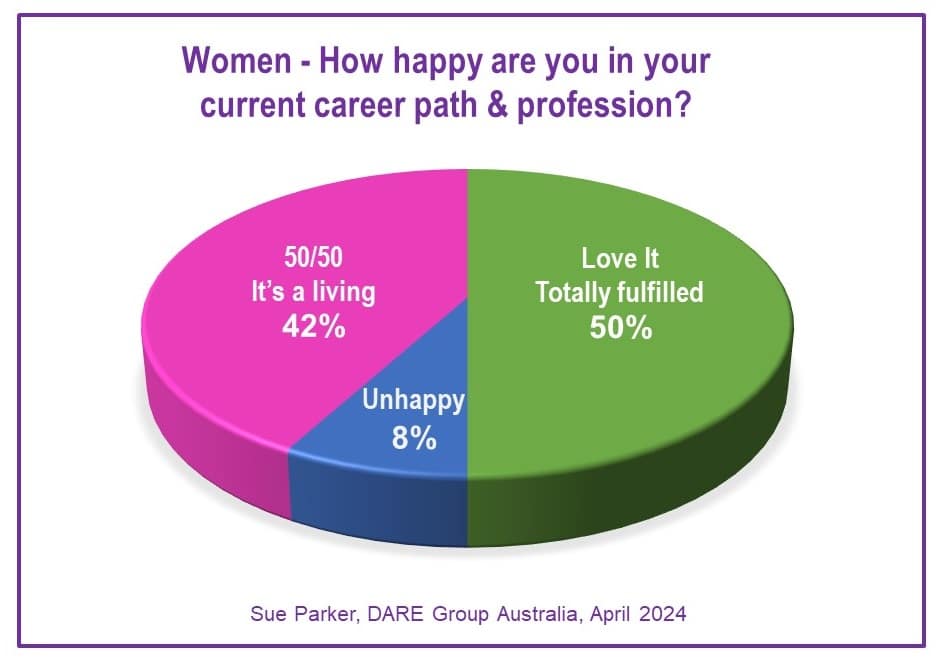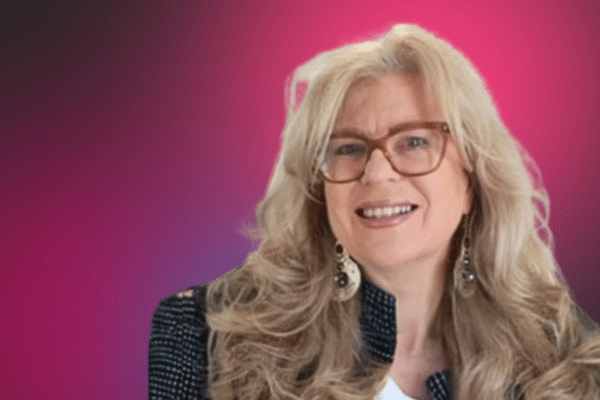The quest for professional happiness and fulfilment is universal. With unique contributing elements for each person, attainment is non-linear and often unpredictable.
The economy, job market, technologies and geopolitical landscape is also unpredictable. Since the pandemic we are living in very different and inexplicable times. These variables impact widely which prompted me to ask women on LinkedIn how they were feeling about their careers.
Are women following a profession that lights their soul and purpose? Are they remaining in a career for financial, cultural or family pressures? Did Sunk Cost Bias or changes to a profession diminish satisfaction?
Before I dive into the poll results let’s unpack some underpinnings.
The difference between happinesss and fulfilment
Being everyday nouns, happiness and fulfilment are entwined, often misused and confused in communications.
Canadian psychologist Dr Jennifer Barbara defines happiness as fleeting sensations of joy, contentment and excitement, whereas fulfilment is the process of fully living a valued life and pursuing what matters.
Dr Barbera says that despite humans being programmed to believe that happiness is the most important thing to seek, fulfilment is more sustainable. Fulfilment also helps people cope with disappointment, sadness, loss and anger.
Choosing careers
The industries and professions we choose and remain in have diverse influences. This is as relevant for a second or third career rodeo with three influence pillars being:
Extrinsic – Financial compensation, prestige, recognition and job security.
Intrinsic – Personal interests, personality, skills, competencies, cultural and gender expectations. The latter encompasses lower income feminised professions to high earning demanding vocations.
Interpersonal – Positive role models, social learning, community and social impact predilections.
Whether at the start or decades in, people can be trapped by unhealthy career beliefs. From fierce ambition, chronic overwork or doing what we think we should do versus what we want to do, keeps many on a mouse wheel.
LinkedIn poll
My LinkedIn poll asked ‘Women – How happy are you in your current career path & profession?’. It received 291 votes, with Australian respondents age ranged from mid 20’s to mid 60’s across public, private and NPO sectors.
A diverse range of occupations and industries voted across mid to C-Suite levels. About 30 per cent were in their second or third career and 10 per cent were self-employed or freelancers.

I was surprised at the low ‘Unhappy’ tally of 8 per cent. This wasn’t consistent to media narratives and research and network conversations over the last four years. There may be several reasons for this low vote including embarrassment, not willing to admit unhappiness or grappling with circumstances.
However, the percentage results across the options were only part of the story. Curious to explore the motivators behind them, I invited 65 women to complete a confidential Q&A. Along with feedback, I asked to rank the work aspects most enjoyed and disliked from:
Work & Responsibilities; Freedom & Flexibility; Money & Security; Management & Colleagues; Making an Impact; Learning & Development; Clients & Stakeholders; Mental Stimulus; Industry Challenges & Opportunities.
Love It respondents ranked Work Responsibilities, Making an Impact and Learning & Development as the aspects most enjoyed.
50/50 respondents ranked Freedom & Flexibility, Learning & Development and Clients & Stakeholders as the aspects most enjoyed.
And the most disliked aspects were Work Responsibilities, Money & Security and Management & Colleagues.
Unhappy respondents ranked Money & Security and Management & Colleagues as the aspects they most disliked.
Analysis includes:
- Unsurprisingly, money and security ranked most disliked for the 50/50 and Unhappy voters. And it was not surprising that making an impact ranked top for Love It respondents.
- The 50/50 and Unhappy voters included talented women over 50 who, after a redundancy, could only find work as a contractor. This caused financial and life challenges as personalities were not suited to the work style.
- Many had grown exhausted with relentless pressures of industry demands and disrespect of their experience. Whilst they loved their actual profession other factors diminished happiness, and if self-employed, financial sustainability.
- Others commented that whilst not mentally stimulated by responsibilities, the trade-off was a solid income and flexible arrangements.
- And for some in the Love It camp, their sphere of impact and stimulating projects surpassed flexibility and management.
- Bullying, overwork and disrespectful behaviour by management and colleagues was a consistent theme impacting women particularly in their 20s and mid-50s.
- Experienced subject matter experts often felt undermined by female peers and managers.
- There was a high degree of uncertainty in the 50/50 group to what their next move could be.
Food for thought
The Q&A indicated many women felt alone without support from colleagues. This correlates in part to the research on How work friendships impact happiness from Job Sage, UK.
They reported 95 per cent of respondents felt having a work friend made them happier, 76 per cent indicated creativity improved and 74 per cent felt productivity increased. And it was found that remote work had a detrimental impact on work friendships.
I believe expecting a perfect career and perfectionism is akin to a fairy tale without a happy ending. The populist unquenchable thirst for success is not for everyone as happiness and fulfilment is individualised.
Tim Duggan, author of Work Backwards believes if you want to be happier at work, be happier outside of work and companies need to let staff enjoy themselves outside work with a fully balanced life.
He debunks the fallacy of work necessitating a succession of “job, career and calling”. Duggan says it’s ok to just have a job or to settle between a job and career as not everyone has a bigger calling.
I totally agree with his tenets and the need for broader expressions of satisfaction.
One respondent wrote that: “Careers have highs and lows and it’s important to remember during the lows that this too shall pass”. A wise mantra that when coupled with the right career motivators, life balance, awareness and courage can help us feel happier and more fulfilled.
Image: Sue Parker.


